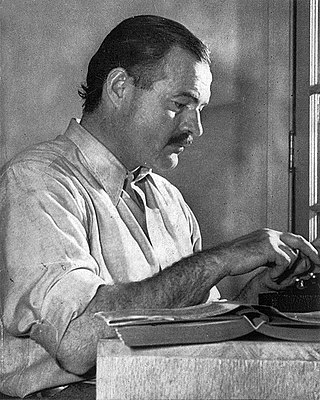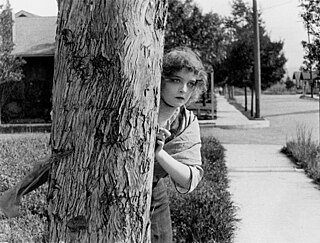Related Research Articles

Ernest Miller Hemingway was an American novelist, short-story writer, and journalist. His economical and understated style—which he termed the iceberg theory—had a strong influence on 20th-century fiction, while his adventurous lifestyle and public image brought him admiration from later generations. Hemingway produced most of his work between the mid-1920s and the mid-1950s, and he was awarded the 1954 Nobel Prize in Literature. He published seven novels, six short-story collections, and two nonfiction works. Three of his novels, four short-story collections, and three nonfiction works were published posthumously. Many of his works are considered classics of American literature.

A Moveable Feast is a 1964 memoir belles-lettres by American author Ernest Hemingway about his years as a struggling expat journalist and writer in Paris during the 1920s. It was published posthumously. The book details Hemingway's first marriage to Hadley Richardson and his associations with other cultural figures of the Lost Generation in Interwar France.

Under My Skin is a 1950 American sports drama film directed by Jean Negulesco and starring John Garfield and Micheline Presle. It is based on the 1923 short story "My Old Man", by Ernest Hemingway, about a jockey being threatened by a mobster after winning a race he had agreed to throw.

True at First Light is a book by American novelist Ernest Hemingway about his 1953–54 East African safari with his fourth wife Mary, released posthumously in his centennial year in 1999. The book received mostly negative or lukewarm reviews from the popular press and sparked a literary controversy regarding how, and whether, an author's work should be reworked and published after his death. Unlike critics in the popular press, Hemingway scholars generally consider True at First Light to be complex and a worthy addition to his canon of later fiction.

Across the River and Into the Trees is a novel by American writer Ernest Hemingway, published by Charles Scribner's Sons in 1950, after first being serialized in Cosmopolitan magazine earlier that year. The title is derived from the last words of U.S. Civil War Confederate General Thomas J. "Stonewall" Jackson: “Let us cross over the river and rest under the shade of the trees.”

The Complete Short Stories of Ernest Hemingway: The Finca Vigía Edition, is a posthumous collection of Ernest Hemingway's short fiction, published in 1987. It contains the classic First Forty-Nine Stories plus a number of other works and a foreword by his sons.

Winner Take Nothing is a 1933 collection of short stories by Ernest Hemingway. Hemingway's third and final collection of stories, it was published four years after A Farewell to Arms (1929), and a year after his non-fiction book about bullfighting, Death in the Afternoon (1932).

The iceberg theory or theory of omission is a writing technique coined by American writer Ernest Hemingway. As a young journalist, Hemingway had to focus his newspaper reports on immediate events, with very little context or interpretation. When he became a writer of short stories, he retained this minimalistic style, focusing on surface elements without explicitly discussing underlying themes. Hemingway believed the deeper meaning of a story should not be evident on the surface, but should shine through implicitly.

Rolfe Sedan was an American character actor, best known for appearing in bit parts, often uncredited, usually portraying clerks, train conductors, postmen, cooks, waiters, etc.
"The Capital of the World" is a short story by Ernest Hemingway. The story takes place in Madrid and follows Paco, a young waiter apprentice, and his desire to become a matador.
Aaron Edward Hotchner was an American editor, novelist, playwright, and biographer. He wrote many television screenplays as well as noted biographies of Doris Day and Ernest Hemingway. He co-founded the charity food company Newman's Own with actor Paul Newman.

Ernest Hemingway: The Collected Stories is a posthumous collection of Hemingway's short fiction, published in 1995. Introduced by James Fenton, it is published in the UK only by Random House as part of the Everyman Library. The collection is split in two parts.

Hemingway's Adventures of a Young Man is a 1962 American adventure film directed by Martin Ritt based on Ernest Hemingway's semi-autobiographical character Nick Adams, and featuring Richard Beymer as Adams. A.E. Hotchner wrote the screenplay, originally calling the film Ernest Hemingway's "Young Man". The cast includes Diane Baker, Jessica Tandy, Ricardo Montalbán, Eli Wallach, Arthur Kennedy and Paul Newman. It was released in July 1962.

The Mothering Heart is a 1913 American short drama film directed by D. W. Griffith. A print of the film survives in the film archive of the Museum of Modern Art.

Ernest Hemingway (1899–1961) was an American novelist, short-story writer, journalist, and sportsman. His economical and understated style—which he termed the iceberg theory—had a strong influence on 20th-century fiction. Many of his works are considered classics of American literature.

Judson Jerome was an American poet, author, and literary critic, perhaps best known for having written the poetry column for Writer's Digest for over thirty years, beginning in 1959. He also taught poetry at Antioch College, where his students included Gregory Orr and Mark Strand.

George Beranger, also known as André Beranger, was an Australian silent film actor and director in Hollywood. He is also sometimes credited under the pseudonym George André de Beranger.

Papa: Hemingway in Cuba is a 2015 Canadian-American biographical film. It was written by Denne Bart Petitclerc, and directed by Bob Yari. The film is based on events from Ernest Hemingway's life in Havana, Cuba in the 1950s, and on a friendship that developed there between Hemingway and Petitclerc, who was then a young journalist. The film received generally unfavorable reviews.

After the Storm is a 2001 American adventure film starring Benjamin Bratt, Mili Avital, Armand Assante, and Simone-Élise Girard. The story centers around the efforts of a group of people to salvage valuables from a sunken yacht in the Bahamas in 1933 and their schemes to betray and double-cross one another.

"For Whom the Bell Tolls" was an American television play broadcast in two parts on March 12 and March 19, 1959, as part of the CBS television series, Playhouse 90. It is a television adaptation of the 1940 novel by Ernest Hemingway. John Frankenheimer was the director. The cast included Jason Robards, Maria Schell, and Maureen Stapleton.
References
- ↑ "Lost Generation"
- ↑ Hotchner, A.E. (1966). Papa Hemingway. London: Mayflower Books. p. 141.